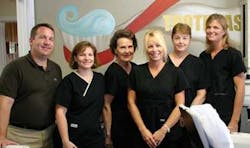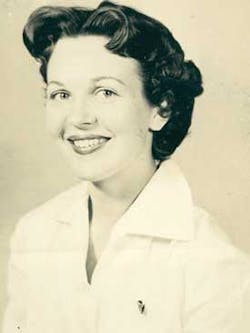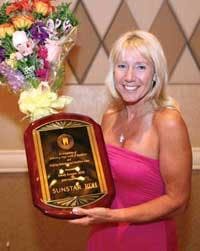Willene Sawadske, third from left, has practiced in the same office for more than 60 years. She is in her third year of working with colleagues in the practice of Dr. Timothy Liptak in Charleston, S.C. Her co–workers are (from left) Dr. Liptak, Amy Natoli, Michele Himes, Kathy Berger, and Diane Ray. Edit this paragraph
60–plus years of practicing dental hygiene
by Nancy W. Burkhart, BSDH, EdD
I recently celebrated a milestone birthday, or a "zero" birthday as some would say. As most people do with birthdays that have a zero in it, I began to look back on my life, take stock of my accomplishments, review regrets or missed opportunities, make future plans, and renew past friendships. With life evaluations, we think of those people who have had an influence on the paths that we have chosen throughout our lives. Most of the time, without even knowing it, we influence others in small or large ways daily.
I am a huge believer that we can never forget history — good or bad. It shapes the future, educates us, and forms our future views of the world (kudos to all those history majors out there!). The recent September premiere of the Oprah show reviewed the 1960s as the audience dressed in appropriate attire from that decade. The show gave the viewers a snapshot of life during those years:
- Microwaves had just come on the market.
- Mascara was introduced — in a tube no less — for $1
- Electric rollers became the new necessity
- Clothes dryers were introduced
- The new GE Automatic Toothbrush cost just $17.88
- The Slinky and the famous Etch A Sketch" were the great Christmas gift ideas.
These items are taken for granted today, but in the 1960s everyone was excited about the new improvements. Reviewing the past is always interesting and necessary because we do not know where we are going unless we know where we have been.
I grew up in Charleston, S.C. Although I have not physically lived there since 1973, my formative years were spent enjoying the beaches, the small–town, friendly atmosphere, and the sunshine. Since 1973, I have lived in many locations throughout the United States — even Hawaii — and visited many other locations inside and outside the United States. My column in RDH is usually on oral case studies, but I am writing today about a special person who has made a difference in dental hygiene and possibly influenced the lives of many dental professionals. Willene Sawadske has seen the evolution of dental hygiene during her 60–plus years of practice. At 81 years old, she has witnessed the progress that has been made in all areas of the dental profession.
Willene Sawadske in uniform displaying new pin for RDH status in 1949.
As a young person, my visits to the dental office were typical in that they were just something you had to do — like it or not. Dr. W.C. Hudson on Ashley Avenue in Charleston was my dentist. The hygienist in his office was Mrs. Willene Sawadske. She was always called Mrs. Sawadske. I remember other relatives saying that if she ever left the practice, they would leave with her. She was that good. My memories of her include the professionalism she displayed, the compassion she exhibited, the knowledge that she was quick to share with patients, and her pleasant demeanor.
She always wore a crisp, white uniform dress, white shoes, and white stockings. Mrs. Sawadske was always on time, finished on time, and I do not remember an unpleasant moment in the time that I spent with her.
With that said, I began to wonder what happened to her and what influence she may have had on my choices in life. While talking to a relative one day, her name surfaced, and I discovered that she was still practicing in the same office — after over 60 years!
Mrs. Sawadske and I recently had lunch when I visited the old office again in downtown Charleston, and we renewed our past relationship. I would very much like to share her story with you.
Charleston, back in the day!
Willene attended an all girl's school in Charleston, Memminger High School. After high school, she knew that she wanted to go into dental hygiene while working as a dental assistant with Dr. Hudson on King Street (the main street of Old Charleston), and she decided to get a license for dental hygiene in 1949.
At that time, Charleston did not have a dental school. The current dental school was not established until 1967, becoming part of the Medical University of South Carolina that had been established in 1824. The closest dental school was in Columbia. When the small number of South Carolina hygienists became licensed, they took their dental hygiene boards in Columbia. Classes in Charleston were conducted by local dentists in the area who paid for textbooks and provided their expertise in teaching courses to prepare the hygienists for the state boards. The classes were held at the St. Francis Hospital in downtown Charleston.
Willene produced a program journal of the yearly dental hygiene state meeting in 1955 when she was vice president. As I began to peruse the program, I instantly began to realize how far the state dental hygiene association has come since that time. Willene described her experience with the local chapter of dental hygienists who shared meetings in 1949 with the dental assistant association and the lab technicians.
"The volume of dental personnel was so small that it was a joint effort," she recalls. The state meeting was held at the Francis Marion Hotel (recently renovated, I may add), and a photo showed 12 members in attendance from Charleston.
Willene began her career with Dr. Hudson, with whom she practiced for over 35 years. His practice was then bought by Dr. W. Steven Ray, and she remained with Dr. Ray for yet another 27 years. Dr. Timothy R. Liptak then bought the practice, and she is in her third year in his practice.
Willene has assistants now who take the radiographs, and she spends her appointment time performing dental hygiene procedures with the patients she loves. Although the office on Ashley Avenue has been remodeled and updated, I can still remember sitting in the same wood–paneled waiting room.
Willene recounted the changes that have occurred since 1949. She is seeing third and fourth generation patients and knows the history of many of the Charleston families personally and professionally. Since specialists were not available in the early years, she remembers the periodontists and dental surgeons who came to Charleston once a month to see special cases. The general dentists did most all procedures, since specialists were not available for periodontal or surgical cases.
She mentioned that the children she treats today have a substantial reduction in anxiety compared to their grandparents, since they have experienced less caries due to the introduction of fluoridation. Most need little to no restorative work.
She said, "There is a completely different psychological experience today than in the early years."
Willene talked about seeing the introduction of masks and gloves in dentistry. She commented that it is difficult to remember that at one time, bare hands were the standard protocol for dental treatment — unthinkable today. Infection control today bears no resemblance to the past, and she was proud to show me the sterilization room in her office. She commented that they are very particular and proud of their standards in her office.
OSHA requirements for dental offices were yet to be heard of in 1949; HIV did not surface until the 1980s; and premedication was used for only severe situations. Electric toothbrushes became available in the 1960s. She recounted the transition from hard toothbrushes to soft toothbrushes, and the introduction of floss was huge news! Prophy paste was kept in a large jar, and individual portions were taken out for each patient. Radiographs were taken with a cone technique and developed by hand. Willene took the boards in 1949 using a belt–driven handpiece! She added that you needed to be very careful not to get your hair caught in the device, because it usually had to be cut out. She has seen the development of sealants, veneers, implants, and in the early years, witnessed many gold foils used for restorations. Some may even ask, "What is a gold foil?"
Willene also commented that not only does she love her work, but she totally loves her life! When she is not practicing dental hygiene, she is enjoying her children, grandchildren, and great–grandchildren. Willlene has a house on the beach; her family gatherings are numerous. She is looking forward to many more hours with the family and friends that she loves.
With all of the literature regarding burnout in dental hygiene, you sometimes think that the life span in the career of a dental hygienist is a short one. Perhaps focusing on the retention of quality health care providers such as Willene, who have long–term careers, can give us some insight in promoting the profession of dental hygiene. Willene's love of her work has been key to a long and successful career. Assessing what really matters to these specific individuals in their professional roles is one aspect that needs to be evaluated more often. Willene certainly exemplifies a person with a passion for her career, and the service she has provided has been outstanding.
Willene may have influenced more people than she knows. Robert Greenfield, in his book, "Servant Leadership," states that business exists as much to provide meaningful work to the person as it exists to provide a product or service to the customer. Will you still be practicing dental hygiene after 60 years? Will you love your work, and what will you have contributed?
About the Author
Nancy W. Burkhart, BSDH, EdD, is an adjunct associate professor in the department of periodontics, Baylor College of Dentistry and the Texas A & M Health Science Center, Dallas. Dr. Burkhart is founder and co–host of the International Oral Lichen Planus Support Group www.bcd.tamhsc.edu/outreach/lichen/ and coauthor of General and Oral Pathology for the Dental Hygienist. Her Web site for seminars is www.nancywburkhart.com.
Sunstar/RDH Award of Distinction
Sandy Kemper, RDH, of Seattle was one of nine recipients of the 2009 Sunstar/RDH Award of Distinction. Her non–profit organization, "Smiles Forever," emerged after a life–changing trip to Bolivia with Dental Outreach. While providing humanitarian care in Cochabamba, Bolivia, she noted that women in a homeless shelter had no vocational training. She helped developed a two–year traditional dental hygiene program that has been accepted by the Bolivian government and the Dental Society of Cochabamba.
Read more about her story in Maria Perno Goldie's International Hygiene column.
Do you know someone who is deserving of the Sunstar/RDH Award of Distinction. Nominate the colleague by visiting www.rdhmag.com and scrolling down on the home page.









